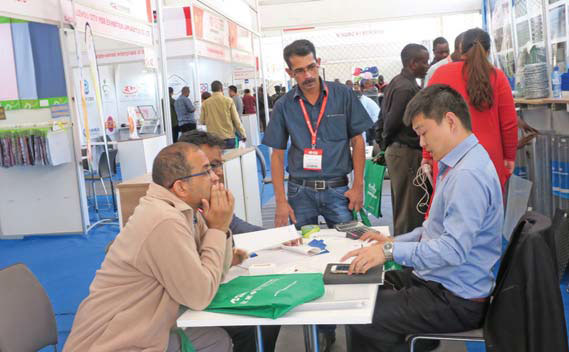Kenya fair shows rising desire for China trade links
Organizer says Nairobi event proved a big hit with traders and visitors
The second China Trade Week outshined the inaugural expo and highlighted Kenyan entrepreneurs' growing demand for Chinese products, according to the event organizers.
Middle East International Exhibition Group says there was a 51 percent jump in visitor numbers this year compared with 2015, up from 16,500 to about 25,000.
|
More contracts were signed at the second China Trade Week, according to the organizers of the event. Lucie Morangi / China Daily |
"We've also seen more contracts signed this time round," says Michelle Meyrick, the group's international events director. Business deals worth about $30 million were inked at the 2015 event.
MIE Group, which is based in Dubai, also organized 200 business matchmaking events and 12 seminars over the three days. Manufacturers in lighting and interior fittings occupied two floors at the venue, the largest of its kind in Kenya. A total of 4,500 products were exhibited.
Many of the booths received large crowds, including those set up by Chinese traders.
Joseph Kiboi, managing director of logistics company CEE Express Kenya Ltd, says he was stunned to find a 150-liter solar water heater system made by Hangzhou Fuyang Guangzhou Solar Energy Technology Co selling for $145, far cheaper than the local retail price of $1,650.
He says the market for Chinese products has remained untapped because of a lack of information.
"The exhibition is an eye-opener for regional traders," Kuria says, adding that he procures locally for the South Sudan market, the latest entrant into the East Africa regional bloc. "Barriers to the Asian market include communication and a lack of Africa-based offices where we can receive after-sales services."
Some traders, like Peter Orre, are already directly sourcing goods from Guangzhou, the southern Chinese metropolis. The market there is advanced and the prices friendly, he says, adding that with his friends he has leased a warehouse to hold goods before shipping.
He adds that he also has concerns that exhibitions like China Trade Week are open ground for brokers, as it is up to manufacturers and buyers to establish each other's credentials before embarking on a business relationship.
MIE Group says its offices in Shanghai, Beijing, Hong Kong and Chengdu vet all applicants looking to take part in its exhibitions.
"The main objective of (China Trade Week) is to eliminate the middlemen and the faceless online companies who are barriers to the African market," Meyrick says. "We intend to strengthen China-Africa links in line with China's Belt and Road Initiative."
Phillip Pande, a research fellow at the Sino Africa Centre of Excellence Foundation, a nonprofit think tank in Nairobi, says there has been a notable increase in awareness among African entrepreneurs of Chinese products. More local businesses are now seeking links with Chinese companies dealing in renewable energy, textiles and apparel, footwear and kitchenware, he says.
Many of the Chinese organizations that took part in China Trade Week said they were pleased with the results.
Jessica Lee, marketing director for Xinxiang Group, which makes wire, says although her company closed only a few deals, she is betting on future demand as the Kenyan market continues to develop.
"This is a new market. We have established meaningful contacts and our business will grow in tandem with the local economy," she says.
lucymorangi@chinadaily.com.cn



















